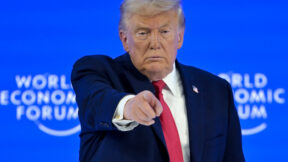Michael Wolff Hasn’t Been ‘Banned’ Over Fear of Trump — Here’s the Real Reason He’s Not Getting Booked on Cable News

Rolf Vennenbernd/AP Images
Best-selling author Michael Wolff has a new tell-all book about President Donald Trump, but you won’t hear about it on any of the major cable news and broadcast networks. He says that’s because Trump has scared the media into banishing him from their airwaves.
Wolff alleged in a column published Thursday in The Hollywood Reporter that he is being blacklisted by cable news and broadcast networks because his latest book about Trump — All or Nothing: How Trump Recaptured America — has the media afraid of upsetting the president.
He singled out the left-leaning network MSNBC, where he said he had been booked to appear before his hit was canceled, citing Trump’s recent lawsuits against ABC and CBS as evidence of this chilling effect.
Yet there is a more logical reason for his exclusion from broadcast and cable outlets: his reputation as a gossipmonger rather than a reliable reporter. In my reporting for this column, I’ve heard from multiple network executives and on-air talent who have confirmed this to me — Wolff’s loose reporting and baseless insinuations are not worth amplifying. He is not getting booked simply because of his lack of credibility.
Wolff is a classic caricature of a New York media type, and his books are anything but dull to read. But he has a well-earned reputation for playing fast and loose with the facts and eschewing airtight reporting for a flashy narrative.
And while television outlets are undoubtedly adjusting to a new risk-reward calculus regarding coverage of the very litigious Trump, authors of other behind-the-scenes books are having no trouble getting booked on air.
Wolff wrote in Thursday’s piece:
While the book was greeted by gratifying reviews in many print outlets, including the New York Times, and debuted at No. 9 on the Times‘ best-seller list, almost every significant television news outlet — ABC, NBC, CBS, CNN — has declined to have it discussed on its news shows. MSNBC, a network whose bread and butter is opposition to the president and which had booked me for several shows, including Lawrence O’Donnell, a show I regularly do when I publish a book, canceled those appearances as soon as portions of the book began to leak, followed shortly by the White House tirades.
Jesse Rodriguez, MSNBC’s chief booker, explained to representatives from my publisher, Crown, the Penguin Random House imprint, that the book was being reviewed by “Standards and Legal,” in itself an unusual step. Rodriguez, who kept assuring my publishing team that he hoped we’d soon be back on schedule, seemed to express surprise as this turned into a multi-week and indeterminate process.
Wolff’s reporting on Trump over the years has sparked many a controversy and considerable criticism from his journalistic peers.
One of the most notable erupted following the release of Wolff’s 2018 book, Fire and Fury: Inside the Trump White House. The tome painted a chaotic picture of the Trump administration, but several individuals featured in his reporting — including Tom Barrack, Tony Blair, Katie Walsh, and Anna Wintour — have disputed direct quotes attributed to them. Sean Hannity denied Wolff’s claim he allowed Trump to review interview questions in advance.
This volume of the denials cast a shadow over the book’s credibility.
Wolff also insinuated that President Trump and then-UN Ambassador Nikki Haley had an affair, a claim Haley vehemently denied and called “disgusting.”
This led Erik Wemple of The Washington Post to accuse Wolff of a “remarkable multimedia slime job,” while Bari Weiss, then writing for The New York Times, criticized him for spreading “evidence-free detail.”
In his new book, Wolff claims that Ivanka Trump and Jared Kushner refused to sign a statement affirming that Trump was not anti-Semitic. This allegation was met with skepticism from Trump’s aides, who accused Wolff of fabricating stories.
Wolff also reported that Melania Trump despises her husband and that their marriage has significantly deteriorated, alleging that she refused to support him publicly during the 2024 campaign. Those close to the Trumps have denied these claims.
Perhaps most sensationally, Wolff released recordings of Jeffrey Epstein discussing his friendship with Trump just days before the 2024 presidential election. On these tapes, Epstein claimed to be Trump’s “closest friend” and described their exploits, painting the president as not just a womanizer and adulterer but smearing him as someone close to the child sex part of the story, the details of which remain unclear. Trump’s campaign accused Wolff of election interference, and critics questioned the timing and ethics of releasing such material, which appeared to have little news value, so close to the election.
This is only a sample of the controversies that have led voices from across the political spectrum to question Wolff’s journalistic judgment and practices. Mediaite’s own Aidan McLaughlin and Diana Falzone challenged him on many of the more fantastical salacious claims made about Rupert Murdoch in a Mediaite interview, which Wolff defended by saying he was telling a story through his eyes. They wrote:
The New York Times, in a review by A.O. Scott, pointed out that Wolff almost entirely avoids describing where his reporting is sourced from. “Instead, assertions of fact and judgments of character emerge through a hazy collective consciousness. Lachlan Murdoch is a ‘chucklehead’; his brother James is a ‘hothead’; Laura Ingraham is a ‘drunk’; Sean Hannity is ‘a moron.’ Who says so?”
Mediaite asked Wolff about the flimsiness of his sourcing, specifically pointing to gossip about Ingraham’s alleged drinking, as well as a scene in which a former Fox News host is described as wearing a revealing outfit to Roger Ailes’s funeral.
“I include here what I believe is incontrovertible truth,” Wolff said. “That’s on the basis of it coming from people that I trust, I’ve dealt with before, I know well. Or on the basis, speaking of revealing outfits, of what I might have personally witnessed.”
The media world is filled with baseless gossip, often shared to undermine a competitor. The political world is precisely the same. The amount of unverifiable slop is staggering, so journalistic standards of confirming reporting with multiple sources exist for good reasons.
Look, Michael Wolff is a fun read, mainly if you accept that he is essentially a gossip. I’ve known him as a professional acquaintance since he launched Newser roughly 15 years ago, and he’s always an interesting individual to talk to. But his books are not thoroughly fact-checked, so what you end up getting is a printed version of the sort of dinner party banter from the Upper East Side events attended by the media and cultural elites.
The thing is, he’s not a journalist; he’s a gossip. But he’s also a cultural phenomenon. And if that sounds over the top, I’ll point to Fred Armisen’s portrayal of him in an SNL cold open seven years ago.
But the reason he’s not getting booked on television show is not because media outlets fear Trump’s wrath. It’s because he stretches the definition of journalistic standards beyond credulity.
This is an opinion piece. The views expressed in this article are those of just the author.
New: The Mediaite One-Sheet Newsletter
Your daily summary and analysis of what the many, many media newsletters are saying and reporting. Subscribe now!






Comments
↓ Scroll down for comments ↓